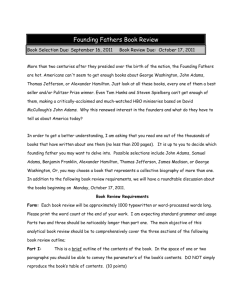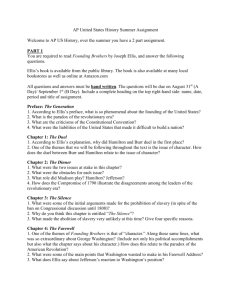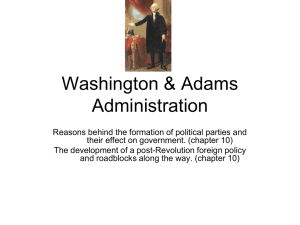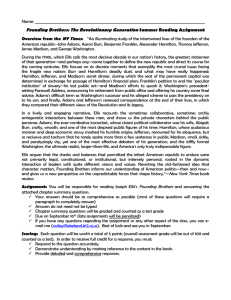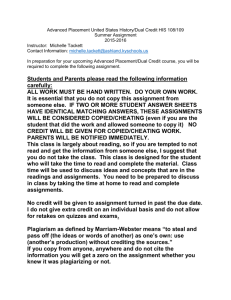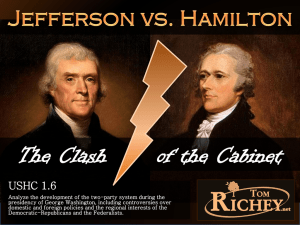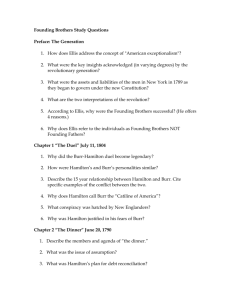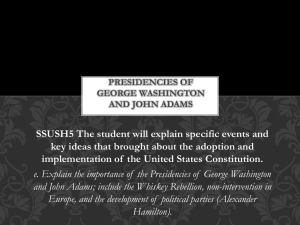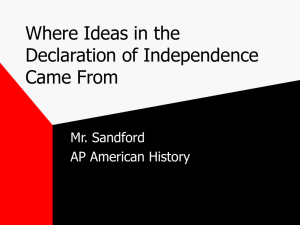AP United States History Mr. James Wilcox AP US History SUMMER
advertisement
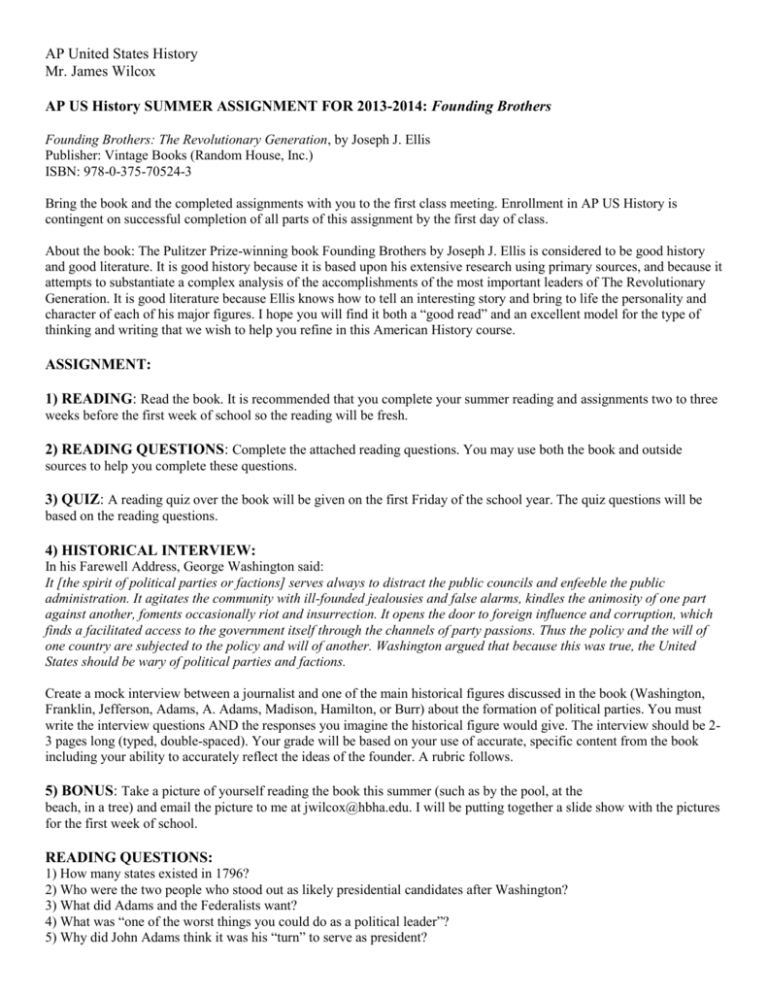
AP United States History Mr. James Wilcox AP US History SUMMER ASSIGNMENT FOR 2013-2014: Founding Brothers Founding Brothers: The Revolutionary Generation, by Joseph J. Ellis Publisher: Vintage Books (Random House, Inc.) ISBN: 978-0-375-70524-3 Bring the book and the completed assignments with you to the first class meeting. Enrollment in AP US History is contingent on successful completion of all parts of this assignment by the first day of class. About the book: The Pulitzer Prize-winning book Founding Brothers by Joseph J. Ellis is considered to be good history and good literature. It is good history because it is based upon his extensive research using primary sources, and because it attempts to substantiate a complex analysis of the accomplishments of the most important leaders of The Revolutionary Generation. It is good literature because Ellis knows how to tell an interesting story and bring to life the personality and character of each of his major figures. I hope you will find it both a “good read” and an excellent model for the type of thinking and writing that we wish to help you refine in this American History course. ASSIGNMENT: 1) READING: Read the book. It is recommended that you complete your summer reading and assignments two to three weeks before the first week of school so the reading will be fresh. 2) READING QUESTIONS: Complete the attached reading questions. You may use both the book and outside sources to help you complete these questions. 3) QUIZ: A reading quiz over the book will be given on the first Friday of the school year. The quiz questions will be based on the reading questions. 4) HISTORICAL INTERVIEW: In his Farewell Address, George Washington said: It [the spirit of political parties or factions] serves always to distract the public councils and enfeeble the public administration. It agitates the community with ill-founded jealousies and false alarms, kindles the animosity of one part against another, foments occasionally riot and insurrection. It opens the door to foreign influence and corruption, which finds a facilitated access to the government itself through the channels of party passions. Thus the policy and the will of one country are subjected to the policy and will of another. Washington argued that because this was true, the United States should be wary of political parties and factions. Create a mock interview between a journalist and one of the main historical figures discussed in the book (Washington, Franklin, Jefferson, Adams, A. Adams, Madison, Hamilton, or Burr) about the formation of political parties. You must write the interview questions AND the responses you imagine the historical figure would give. The interview should be 23 pages long (typed, double-spaced). Your grade will be based on your use of accurate, specific content from the book including your ability to accurately reflect the ideas of the founder. A rubric follows. 5) BONUS: Take a picture of yourself reading the book this summer (such as by the pool, at the beach, in a tree) and email the picture to me at jwilcox@hbha.edu. I will be putting together a slide show with the pictures for the first week of school. READING QUESTIONS: 1) How many states existed in 1796? 2) Who were the two people who stood out as likely presidential candidates after Washington? 3) What did Adams and the Federalists want? 4) What was “one of the worst things you could do as a political leader”? 5) Why did John Adams think it was his “turn” to serve as president? 6) Who won the 1796 presidential election? 7) Who was elected Vice-President? Why? 8) What did the 12th Amendment do? 9) What problems did Washington leave behind for the new President to solve? 10) To whom was Adams’ cabinet loyal? 11) How did John Adams view Alexander Hamilton? 12) Why were the French angry about Jay’s Treaty? 13) Why did the XYZ Affair lead to Anti-French sentiment in America (what happened that was so offensive)? 14) What did the Alien and Sedition Acts do? 15) What did the Virginia and Kentucky Resolutions aim to do? 16) What kinds of slurs did each side use against the other in the election of 1800? 17) How was Aaron Burr different from other political leaders of his time? 18) How did Alexander Hamilton affect the election of 1800? 19) What 2 deaths did John Adams experience at this time? 20) Where was Jefferson was the first President to be inaugurated? 21) What did Jefferson mean when he said, “We are all Republicans, we are all Federalists” in his inaugural address? 22) What was Jefferson’s vision of the future? 23) What did the Federalists accuse Jefferson of in numerous newspapers [more than one thing]? 24) What event prevented the Hemmings affair from hurting Jefferson’s reputation at the time? 25) Why did Jefferson want to buy Louisiana? 26) For how much did Napoleon sell the Louisiana Territory? 27) By how much did the Louisiana Purchase increase the size of the U.S.? 28) What was an “affair of honor”? 29) Why didn’t Alexander Hamilton like Aaron Burr? 30) What did Hamilton plan to do with his shot during the duel with Burr? 31) How did the duel affect Burr’s political career? 32) What were the effects of the Embargo Act? 33) How did John Adams think he would be viewed by history? 34) What did John Adams say in his last public statement? 35) On what date did Adams and Jefferson die? What was the significance of this day? Historical Interview Rubric Historical Interview Rubric Questions effectively focus on a specific aspect of the topic (political parties) The introductory and closing questions set-up and end the interview appropriately Contains a minimum of 10 open-ended questions and answers Answers demonstrate knowledge of history and information from the Founding Brothers Book Answers are specific, accurate, detailed with use of facts to support point, and focused on the topic (political parties) Convention (grammar, spelling, punctuation, capitalization) Writing Style: sentence fluency, organization, word choices, and voice add to the understanding of the topic Strong Effective 10 9 Developing 8 Emerging 7 Not Yet 5 10 9 8 7 5 10 20 9 18 8 16 7 14 5 10 30 27 24 21 15 10 10 9 9 8 8 7 7 5 5


